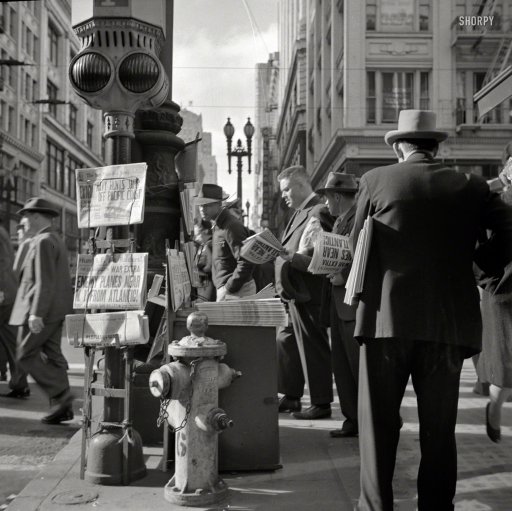
John Collier Street Corner, Monday after Pearl Harbor, San Francisco Dec 8 1941
Janet Yellen today solemnly stated that the Fed has killed QE because the jobs outlook has improved. These are the guys and gals who have more and better access to more and better data than any of us have. And we all know that the sole reason the BLS unemployment rate has fallen is that 90-odd million working age Americans are no longer counted as part of the work force, and a huge part of those who are still employed moved to worse-paying jobs and/or had their pay and/or benefits cut.
To claim that QE improved the jobs picture is either very stupid, and I’ve never thought that gang is stupid, just perverted, or it means they don’t have the proper data, but we already saw that they do. So that jobs thing is bollocks.
And I haven’t seen anyone come up with a satisfactory answer as to why the Fed really quit QE the moment they’re doing it. Here I’m thinking that’s an interesting question, and all the pundits and experts leave that question alone. Then again, I have of course tried to answer it, a number of times, with the help of some other people’s observations, and noted that Wall Street banks saw their profits slip because everyone was on the same side of the wagers as they were. They were still getting the free money, but they couldn’t make it work for them anymore the way it once did. And something had to change.
Does anyone outside the Fed want to claim that QE had a positive influence on the American economy, other than through boosting prices of stocks and homes that could only happen because people started seeing things that weren’t really there? I guess there’s plenty of you out there who think the jobs picture actually has improved, and that those $4 trillion or so actually had something to do with that, but that only leads us right back to the beginning:
Why does the Fed cut QE now, when in reality nothing has improved in the American economy if you wipe the smoke from the mirrors, and they know it, even if they say the opposite? And if their view remains as distorted as it is today, why wouldn’t they raise rates much sooner than everyone seems to presume? QE never had anything to do with the real economy (even Greenspan said as much in the WSJ), so there’s no point in keeping rates low to save that real economy. QE has created a perception only, and no substance. And if they take away the perception, there still won’t be any substance, so why not do it?.
When you see Greenspan being paraded in public like he was in the WSJ this morning, you know everything must be scripted. That’s no coincidence. You know, just in case you hadn’t figured that out yet. The Oracle is pushed onto the stage to confuse the ranks a bit more, just so as much money as possible stays invested in the very things Wall Street wants them to be invested in. Greenspan’s job is to say the things Yellen cannot. His words are published the morning of the day she’s set to announce the death of QE.
He said that the purchases of Treasury and mortgage-backed securities did help lift asset prices and lower borrowing costs. But it didn’t do much for the real economy. “Effective demand is dead in the water” and the effort to boost it via bond buying “has not worked,” said Mr. Greenspan. Boosting asset prices, however, has been “a terrific success.”
Too many questions there to mention. Asset prices are high but there’s no demand, to sum it up. Which raises that one question again: if “effective demand is dead in the water”, why kill QE? Or: if QE boosted asset prices, what will its demise result in?
Asked whether he regrets not doing more with Fed policy to stop the financial-market bubbles that preceded the crisis, Mr. Greenspan said “no.” He observed that history shows central banks can only prick bubbles at great economic cost. “It’s only by bringing the economy down can you burst the bubble,” and that was a step he wasn’t willing to take while helming the Fed …
Greenspan effectively admits he created a bubble in those words, plus he doesn’t regret it. And he realizes the only way to burst the bubble, which, he also admits, has grown to behemoth proportions through QE, is by bringing the economy down.
There’s tons of people claiming QE4 is just around the corner. I’m certainly not one of them. I think the Fed is going to do what Greenspan said there: bring the economy down. And justify that by saying that it’s the only way to burst the bubble and make it healthy again. Raise interest rates and declare that they’ve been too low for too long. Pump up the dollar and claim it’s been undervalued too long because of the global impact of QE’s flood of cheap credit.
Low interest rates don’t work to improve the real economy. Neither does free credit for Wall Street. So now that more people are finally figuring that one out, they’re going to let go of these manipulations that pose as policies, while supporting their member banks in making the biggest possible profits off of the impending changes.
And don’t think that every move they’ve made over the past years has not been as scripted as the Greenspan interview. The Fed doesn’t react to – changing – circumstances, it scripts them. And it’s not about Greenspan or Yellen or Bullard or even Jamie Dimon, they’re hand-puppets; it’s about the wizards behind the curtain. Pretty clear cut. You just have to pay attention. Or you’ll lose your shirt and then some.







